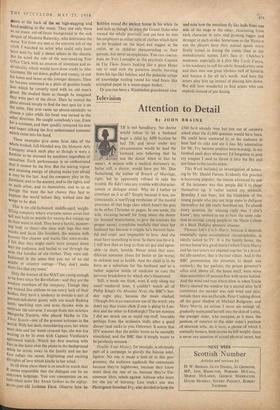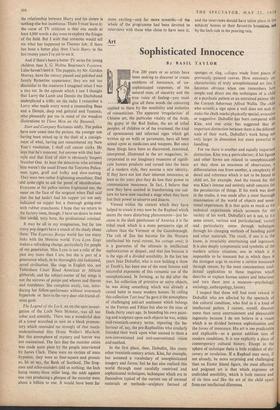Television
Attention
to Detail
By JOHN BR AINE
TB is not hereditary. No doctor would refuse to let a husband beget a child by AIH because he had TB; and never under any circumstances would he lead the husband into believing that he was the donor when in fact he wasn't. A minute with a medical dictionary or, better still, a doctor, would have put Mr. Dan Sutherland, the author of Breach of Marriage, right; but he apparently refused to take the trouble. He didn't take any trouble with character- isation or dialogue either. Why do I bother to comment on it at all? Simply because it was, un- consciously, a scarifying revelation of the mental processes of that huge class which hasn't the guts to be either Christian or pagan. In one scene, the wife, excusing herself for lying about the donor (or licensed masturbator, to give the creature his proper name), complains tearfully that since her husband has become a cripple he's become hate- ful and cruel, and impossible to love. And she must have something to love. So there you have it. I will love thee as long as thou art gay and agree- able—in short, lovable. Never mind that ante- diluvian nonsense about for better or for worse, in sickness and in health. And the child is to be born as a substitute for the husband and as a rather superior bottle of medicine to cure the nervous breakdown by which she's threatened.
Still, it made me think, even if only along my usual medimval lines. I couldn't watch all of Philip King's On Monday Next, the BBC's Sun- day night play, because the times clashed. (Though this is an inaccurate use of the word; you don't say that trains clash if one is going to Lon- don and the other to Edinburgh.) The ten minutes I did see struck me as vapid rep stuff, bearable perhaps from the orchestra stalls after a good dinner (and sucks to you, Osborne). It seems that ITV assumes that the public wants to be mentally stimulated, and the BBC that it simply wants to be painlessly amused.
Double Your Money, for example, is obviously part of a campaign to glorify the human intel- ligence. No one is made a foal of in this pro- gramme; the audience applauds the contestants because they're highbrows, because they know more than the rest of us, because they're Un- common Men, rebels against Admass who learn for the joy of learning. Last week's star was Plantagenet Sotnerset Fry, who decided to keep the £500 he'd already won but just out of curiosity asked what the £1,000 question would have been. He could have answered it; so the audience at least had its cake and ate it too. My admiration for Mr. Fry became positive hero-worship; in my football pool days whenever I'd forgotten to post my coupon I used to throw it into the fire and not listen to the results either.
This Week included an investigation of tattoo- ing by Mr. Daniel Farson. Evidently this practice is becoming popular; the reason advanced by one of the tattooers was that people did it to cheer themselves up. It rather turned my stomach. Brutality I can bear; but the blankness of the young people who pay out large sunis to disfigure themselves for life really horrified me. To almost every question the whining reply was 'I don't know'; they seemed to me to bear the same rela- tion to normal young people as the Marie Celeste to a Bank Holiday pleasure steamer.
Thomas Job's Uncle Harry, because it depends essentially upon accumulated claustrophobia, is ideally suited to TV. It is the family home, the terrace house in a good district where Uncle Harry and his two sisters are chained together in a dread- ful idle comfort, that is the real villain. And in the BBC presentation the attention to detail was masterly; the bar parlour, the prison governor's office and, above all, the home itself, were more than assemblies of painted flats with struts behind. And the wind and rain which blew in when Uncle Harry opened the window for a second after he'd committed the murder was real wind and rain; outside there was an Outside. Peter Cushing shook off the giant shadow of Michael Redgrave; and Mary Morris, an actress I never see enough of, gradually insinuated herself into the skin of Lettie, the younger sister, who occupies, as it were, the position of mistress to the elder sister's position of shrewish wife. As it were, a phrase of which 1 normally beware, here carries its full weight; there is never any question of actual physical incest, but the relationship between Harry and his sisters is nothing else but incestuous. There I must leave it; the curse of TV criticism is that one needs at least 4,000 words a day even to explore the fringes of the field. But I wish that someone would tell me what has happened to Thomas Job; if there has been a better play than Uncle Harry in the last twenty years I've yet to see it.
And if there's been a better TV series for young children than S. G. Hulme Bearman's Toytown, I also haven't seen it. The puppets, by Mr. Gordon Murray, have the correct planed and polished and faintly Byzantine appearance; they are not too dissimilar to the creatures I imagined when I was a tiny tot. In the episode which I saw I thought that Larry the Lamb and Dennis the Dachshund underplayed a trifle; on the radio I remember a Larry who made every word a resounding Baaa and a Dennis, deep and guttural and Teutonic, who pleasantly put me in mind of the woodcut illustrations to Three Men on the Bummel; Starr and Company fluctuates oddly. The police have now come into the picture, the younger son having been mixed up in the theft of a consign- ment of what, having just remembered my New Year's resolution, I shall call cancer sticks. He says that he's innocent, but anyone with that hair- style and that kind of shirt is obviously Suspect Number One. At least the detectives who arrested him weren't the usual Ernest the Toytown Police- man types, gruff and bulky and slow-moving. They were two rather frightening smoothies; Dad did quite right to ask for p;oof of identification. Everyone at the police station frightened me; the sneer on the face of the sergeant when Dad said that the lad hadn't had his supper yet not only indicated no supper but a thorough going-over with rubber truncheons. I hope that we return to the factory soon, though; I have no desire to meet that sordid, tatty bore, the professional criminal.
It may be all in my imagination, but far too many pop singers have a smack of the shady, about them. The Expresso ,Bongo world has too many links with the Messina world. Vera Lynn Sings makes a refreshing change, particularly for people of my generation. Miss Lynn is not a relic of the past any more than I am, but she is part of a generation which, to be thoroughly old-fashioned, saved civilisation. She sings in English too, not Tottenham Court Road American or African gibberish, and the subject-matter of her songs is not the sorrows of pimps and whores and thieves and murderers. She comperes nicely, too, intro- ducing her fellow-performers without overmuch hyperbole or here-is-the-very-dear-old-friend-of- mine gush.
The Legend of the Loch, an on-the-spot investi- gation of the Loch Ness Monster, was all too sober and scientific. There was a wonderful shot of a tower wreathed in mist on a bleak promon- tory which reminded me strangly of that much- underestimated film Orson Welles's Macbeth.'
But this atmosphere of mystery and horror was not maintained. The fact that the monster exists was made quite plain by the people interviewed by James Clark. These were no victims of mass hypnosis; they were as four-square and prosaic as, let us say, the Bank of Scotland. The frog- men and echo-sounders told us nothing; the loch being twenty-three miles long, the odds against one visit producing a glimpse of the monster were about a billion' to one. It would have been far more, exciting—and, far more scientific—if the whole of the programme had been devoted to interviews with those who claim to have seen it; and the interviews should have taken place in the subjects' homes or their favourite hostelries, no4 by the loch-side in the pouring rain.



































 Previous page
Previous page